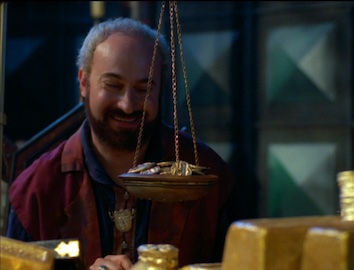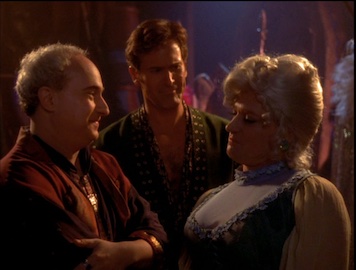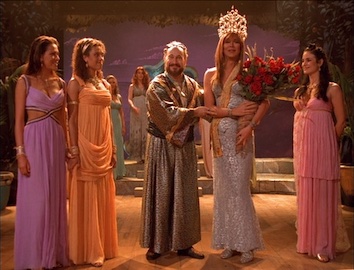
Literally speaking, Eve is the redeemed spirit of Callisto, reborn by choice as #Xena’s child. Reincarnation is part of the Elijian cosmos on this show (as it was among some early Christians). That said, there’s an interesting line that gets overlooked in that ep, “Seeds of Faith,” in which #Xena, who doesn’t trust Callisto’s new perspective, dares her to get off her angelic high horse & try living in the real world again. I wonder if this put the idea in Callisto’s head to accept this challenge, deciding to be reborn as her child?
If so, this casual taunt of #Xena’s sets in motion some amazing events for the rest of the series, not to mention, endanger Callisto’s salvation when, as Eve, she gets separated from her mother & reverts to her warlord ways. This also leads to some interesting layers in Xena’s & her child’s relationship, as adults. Though they don’t know each other, after 25 years separation, still, there’s the unusual bond between Xena & Callisto that surely must exist. In a sense. Xena is the mother of 2 people: Callisto & Eve; quite a burden.
This is the final shape of Eve’s origin, but it took a while for the writers to arrive at this, given that the show changed hands during this period between its temporary show runners, & the return of R.J. Stewart from running the spin-offs. Preliminary plans were made, perhaps from Rob Tapert’s notes, I’m guessing, for Eve’s birth, the Twilight of the Gods, & finally, the 6th & last season. Some of these were kept, but a fair amount of Eve’s story was dramatically revamped.
Originally, Eve as Livia was intended to continue on through to the end of the show. She would pursue Xena & Gabrielle as Caesar’s queen, while the heroes fled Greece much like they did in season 5 from the gods, under different names. A final confrontation in the series finale would end with Livia realizing who she was, and Caesar beginning the Pax Romana, the Roman Peace. I’m glad they didn’t do this. It’s the equivalent of Gabrielle’s descent into madness in The Play’s the Thing, turning a show about peace into a bloodthirsty crowdpleaser, destroying the message in the process.
Rob wanted Livia to last only 2 eps, ending season 5 with Eve’s return, so a different idea was proposed: Livia corrupts Caesar & tries to get Ares to build a siege engine that shoots firebolts (which sounds to me very much like Ares’ unsuccessful 1st appearance on #HerculesTheLegendaryJourneys ).
It also reinforces an unsavory idea (to me, at least), by blaming Livia’s evil on her innate evil qualities inherited from Callisto’s spirit. The writers saw it as Callisto’s karma she had to work off, but that doesn’t make sense to me: would an angel carry bad karma? Of course, in the dvd commentary, both Rob Tapert & R.J. Stewart suggested this was so, but this is a rare moment when I think the writers got it wrong. I think Adrienne Wilkinson got it right when she attributed it to Livia’s upbringing.
It’s the most logical conclusion, & no surprise, since she would have to make logical sense of the role with her performance. This is also how I interpret Livia’s downfall, & I’ll talk more about this next week, when I discuss the Elijian philosophy.
These are story details, but the overall arcs also help shape Eve’s origins. There’s the Child of Destiny, i.e., the Rosemary’s Baby motif, that culminates in Eve’s story, but there’s also the series-long teasing of the coming of the One God to replace the Olympians that is fulfilled with Eve’s character. But there is another motif as well: the Dionysus motif, which is strongly associated with Xena, but finds full expression with Eve, as she most resembles, more than anyone, the character of Dionysus in The Bacchae: the stranger who brings the new disruptive faith to town, & leads to the undoing of those who refuse it.
There are hints that Eve fits this pattern in her names, as well. It was Chris Manheim who originally gave her the name Livia, taking it from the BBC series, “I, Claudius,” & the matriarchal figure from The Sopranos. But I notice she was referred to as Lydia in one of the early drafts, making me think this was a placeholder name, which I believe was taken from The Bacchae: Dionysus declares he has arrived from his home, Lydia.
Eve’s name has several roots, I believe. Paradise Lost was one of the sources that was required reading at this stage of the show, featuring Adam & Eve at the center of a war between Heaven & Hell. Another, I’m certain, was Aristophanes’ comedy, The Women’s Festival, which refers to Dionysus by his other names: Evius, Evivus, & Evoe. I believe The Women’s Festival was used as a source for a number of Xena episodes, including Kindred Spirits, which is where Xena took baby Eve to protect her from the gods. But there’s one more major factor to Eve’s origins I believe we should look at.
Over at Hercules, as Xena was airing Adventures in the Sin Trade, in which Xena is separated from Gabrielle by death, there is a similar, but longer arc on Hercules, in which Herc is also separated from his friend Iolaus. That arc is much longer, & explores that idea much more fully (due to Herc having more flexibility in its format: Xena fans would not tolerate Gabrielle being out for an entire season).
At one point, Hercules goes to Ireland, where he meets a group of druids who are very similar to Elijians: they’re a new religion, threatening to the old gods’ order. They send an assassin, Morrigan, to eliminate the druids, but she quickly discovers that when she kills the Druid of Justice, she must take his place. It’s a role that’s completely opposite to who she is, & the very idea of it makes her ill. Hercules is the mediator, the one who provides exposition by asking the druids how this all works, then talking to Morrigan in her now-weakened state, since she can no longer drink the blood that sustains her.
This is a full season before Eve’s story, but it’s very similar; in fact, it gives us a few more story beats to Eve’s story, should we want to extend it, & that’s what I’ve done in this project, using this idea of Morrigan trying to adjust to this new life of justice & peace, feeling very unsuited to it all, but finding her motivation in the end.
I think this beat is missing in Eve’s story, & can help provide background should we wish to expand on her story further. There’s one more building block to consider, & that’s the biblical source of her story. When Motherhood originally aired, it was immediately recognized that Eve’s story matched St. Paul’s story, in the New Testament Book of Acts. His conversion from persecutor of Christians to their greatest champion is clearly a model for Eve.
I will address this more next week, but I believe she is not just modeled on a generic idea of Paul, but on a very specific literary depiction of Paul that will shed light on her & the Elijians. Understanding these sources was key to how I approached this project, as well.





